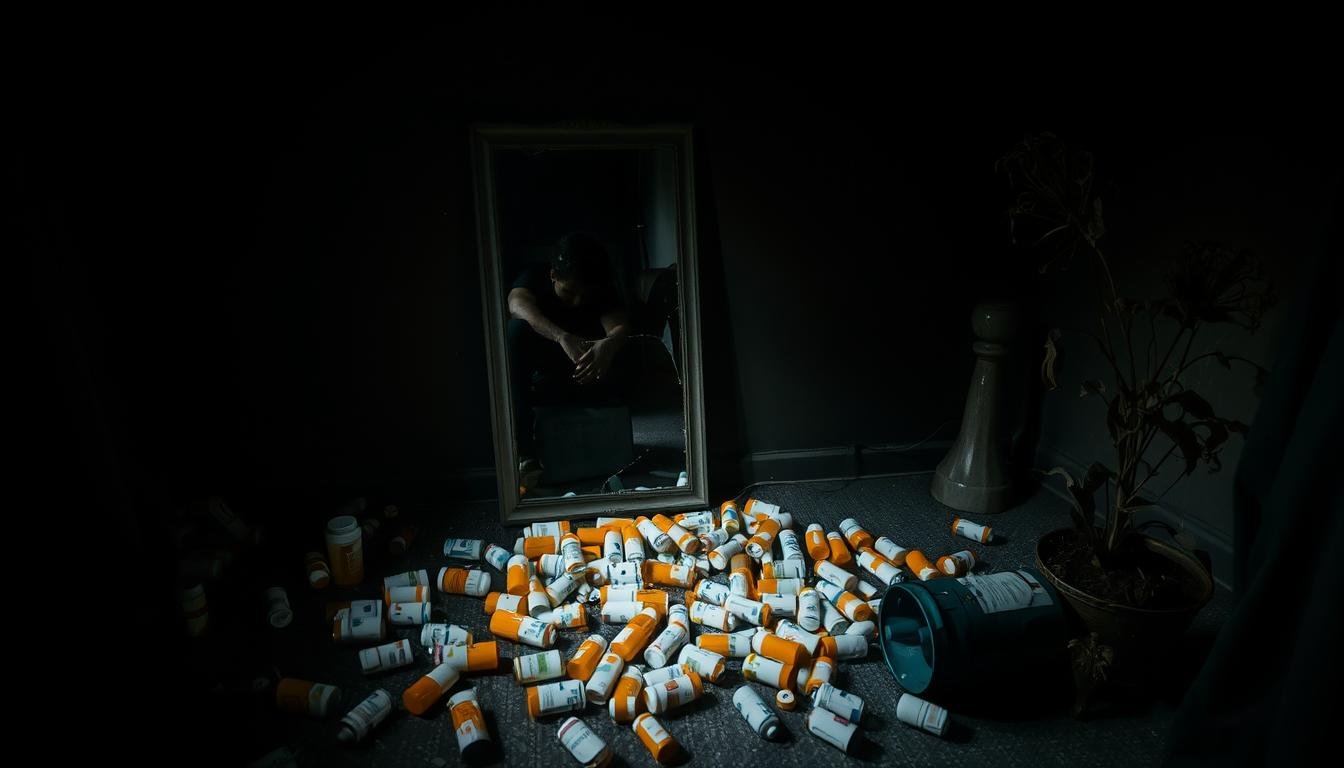How to Help a Drug Addict Son – Parent Support Guide
Watching your son fight drug addiction is heartbreaking. Yet, you can help him recover. But, what steps can you take to effectively help your drug-addicted son?
This guide will cover addiction’s science, warning signs, and support strategies. We’ll explore substance abuse, treatment options, and how to be a strong support in your son’s recovery.
Key Takeaways
- Addiction is a chronic disease that affects brain function and can be treated with the right support.
- Recognizing the signs of substance use disorder, such as prolonged use, inability to stop, and neglecting responsibilities, is key.
- Talking about it in a safe space and showing love and support can help your son seek help.
- Treatment options include medical detox, inpatient rehab, outpatient programs, and telehealth therapy.
- Understanding insurance and researching facilities can start the recovery journey.
Understanding Drug Addiction in Young Adults
Drug addiction is a chronic brain disease that makes it hard to control substance use, even when it causes harm. For young adults, knowing the science behind addiction and common risk factors helps parents. This knowledge improves the chances of successful intervention and treatment.
The Science Behind Addiction
Addiction changes the brain’s reward system, making users seek out substances like alcohol and opioids. This can lead to lasting changes in the brain, making it hard to stop using drugs. Young people’s brains are developing, making them more vulnerable to addiction.
Risk Factors Contributing to Substance Abuse
- Genetic predisposition and family history of addiction
- Environmental influences, such as peer pressure and easy access to drugs
- Mental health issues, including depression, anxiety, and trauma
- Stressful early life experiences and lack of parental supervision
Common Substances and Their Effects
The most commonly abused substances by young adults include:
- Alcohol: Depressant that impairs judgment and coordination
- Opioids: Painkillers that can lead to dependence and overdose
- Stimulants: Drugs like cocaine and methamphetamine that increase energy and focus but can cause erratic behavior and addiction
- Marijuana: Can impair cognitive function and increase the risk of mental health issues
Understanding addiction and risk factors helps parents and caregivers support young adults. This support is key to addressing substance abuse effectively.
Recognizing the Signs of Drug Addiction in Your Son
As a parent, it’s key to spot drug addiction signs early. This helps in starting treatment and supporting recovery. The National Survey of Drug Use and Health shows many people in the U.S. face substance abuse issues. About 65.7% use alcohol, 13.5% use marijuana or hashish, and 17.8% use illicit drugs.
Look out for these signs of drug addiction in your son:
- Unexplained mood swings, like sudden irritability or feeling very tired
- Ignoring personal care and daily tasks
- Steering clear of family and friends
- Dealing with money problems or needing more cash
- Finding drug tools or strange substances
Each drug has its own signs of use. For example, marijuana users might have red eyes and seem very relaxed. Users of stimulants could act aggressively and breathe fast. Opioids can cause someone to feel very sleepy, forget things, and have trouble going to the bathroom. Knowing these signs can help you act fast.
Spotting these signs early can greatly help your son’s recovery chances. Ron Grover, a parent who’s been through this, says, “Recovery is possible. My son has been clean for over 10 years after a long battle with addiction.” By watching closely and getting help from addiction counseling, you can help your son fight addiction and take back his life.
“Recovery from addiction is possible, as evidenced by Ron Grover’s son who has been clean for over 10 years. Ron Grover’s son was trapped in active addiction for seven years before seeking recovery.”
How to Help a Drug Addict Son: Essential First Steps
Dealing with drug addiction is tough for parents. But knowing the first steps can help a lot. Recovery starts with a supportive space, open talks, and clear rules.
Creating a Supportive Environment
It’s key to show love and understanding to someone with addiction treatment options. But, it’s also vital not to enable their addiction. Finding a balance between caring and guiding can help your son find the right best treatment options for a drug-addicted son.
Establishing Open Communication
Good communication is the base of any successful help. Talk to your son with an open mind, listen without judging, and share your worries calmly. Don’t use threats or harsh words. Instead, have honest talks that help find the root of his addiction.
Setting Healthy Boundaries
Setting and keeping healthy boundaries is key for your son’s recovery and your peace. This might mean rules about drugs at home, consequences for bad behavior, and limits on money or things that could help his addiction. Clear rules and actions help your son take responsibility and start changing.
“The first step in helping a drug-addicted son is creating a supportive, understanding environment while setting firm boundaries. This lays the foundation for effective intervention and long-term recovery.”
Helping a drug-addicted son needs patience, effort, and a wide approach. By starting with these steps, you can guide your son towards a sober, purposeful life.
Intervention Strategies and Family Support
Addiction recovery is a tough journey that needs family support. Family interventions can help encourage treatment and support long-term recovery. Professional interventionists guide the process, making it structured and effective.
Family support is key during recovery. Joining family therapy and support groups like Al-Anon or Nar-Anon is helpful. Learning about addiction and recovery helps create a supportive environment for your son.
| Intervention Strategies | Family Support |
|---|---|
|
|
An intervention is not about shaming or scolding. It’s a compassionate effort to help your son see the need for treatment. With the right strategies and family support, your son can beat addiction and live a healthy life.
“The family is the first school for young children, and parents are powerful role models.”
Treatment Options and Recovery Programs
Understanding the different treatment options and recovery programs is key when helping a drug-addicted son. Rehabilitation centers are vital, providing therapies and support tailored to each person’s needs. Let’s look at the main treatment approaches that help in recovery.
Medical Detoxification
Medical detox is often the first step in recovery. It safely manages withdrawal symptoms under medical watch. This ensures the body is free from substances, reducing discomfort and risks.
Inpatient Rehabilitation
Inpatient rehab centers offer intensive care in a home-like setting. Clients live there, away from temptations, and get constant support. This approach helps deeply address addiction, build coping skills, and lay a strong recovery foundation.
Outpatient Programs
Outpatient programs are flexible for those with work or family duties. They include therapy sessions, group counseling, and support, while clients live at home. They’re good for those with less severe addictions or as a step-down from inpatient care.
The right treatment depends on addiction severity, any co-occurring disorders, and personal situations. Rehabilitation centers are key in recovery, addressing addiction’s physical, psychological, and social aspects.
| Treatment Option | Weekly Time Commitment | Living Arrangement |
|---|---|---|
| Low to Medium Intensity Outpatient | No more than 9 hours | Live at home |
| Medium to High Intensity Outpatient | 10-20 hours | Live at home |
| Day Treatment | 20 or more hours | Live at home |
| Residential Treatment | Varies, typically 1 month to 1 year | Live at the treatment facility |
The choice of treatment option depends on the individual’s needs, the severity of the addiction, and their personal circumstances.
Supporting Your Son Through Recovery
Recovering from drug addiction is tough, but with your support, your son can do it. As a parent, you play a big role in helping him stay sober and rebuild his life.
Encouraging your son to join sober living facilities is important. These places offer a safe space for him to move from inpatient care to living on his own. They help with supporting addiction recovery by creating a community of people who want to stay sober. They also provide counseling services and other resources for recovery.
Family therapy is also key. It helps you work through issues, improve how you talk to each other, and find ways to keep your home free of drugs. Supporting your son in attending meetings like Narcotics Anonymous or SMART Recovery can also help him stay on track. It gives him a chance to connect with others who are going through the same thing.
Don’t forget to take care of yourself too. Look into joining a support group for families dealing with addiction or getting counseling services for yourself. Taking care of your own needs will help you support your son better.
Every person’s recovery is different. Be open to trying new things, be patient, and keep showing your love and support. With your help and your son’s hard work, he can beat the challenges and take back his life.

“The greatest gift you can give someone is your time, your attention, and your love. When you make a person feel seen, heard, and loved, you’re giving them the greatest gift of all.” – Toni Morrison
Role of Professional Counseling and Therapy
Professional counseling and therapy are key in beating addiction. They tackle the root causes of substance abuse. This helps people build skills and support systems for lasting sobriety.
Individual Counseling Benefits
Therapies like cognitive-behavioral therapy (CBT) and dialectical behavior therapy (DBT) are very effective. They help people change negative thoughts and behaviors that lead to drug cravings. Addiction counselors create treatment plans that fit each person’s needs.
Family Therapy Importance
Addiction hurts not just the person but also their family. Family therapy fixes broken relationships and improves communication. It can lower relapse rates and make families happier, helping children of addicted parents too.
Group Therapy Options
Group therapy is very helpful for those struggling with substance use. It offers peer support and a sense of community. Programs like Narcotics Anonymous (NA) and Methadone Anonymous use the 12-step model to help people overcome addiction.
Combining individual, family, and group therapy gives a full support system for recovery. These approaches help people develop coping skills, mend relationships, and find community in their journey to sobriety.
| Therapy Type | Description | Key Benefits |
|---|---|---|
| Individual Counseling | Cognitive-Behavioral Therapy (CBT), Dialectical Behavior Therapy (DBT) | Helps individuals recognize and replace negative thought patterns and behaviors, offers positive incentives to stay clean |
| Family Therapy | Addresses the impact of addiction on the family, improves communication and relationships | Reduces relapse rates, increases family happiness, benefits children of addicted parents |
| Group Therapy | Peer-based support programs like Narcotics Anonymous (NA), Methadone Anonymous | Provides a sense of community and accountability, helps individuals overcome addiction through peer support |
“Counseling and therapy are essential components of addiction recovery, helping individuals address the underlying issues, develop coping skills, and find support within their community.”
Preventing Relapse and Long-term Recovery
Recovering from addiction takes more than just the first treatment. It’s about preventing relapse and making lasting lifestyle changes. These steps help keep you sober and avoid going back to substance use.
Knowing your personal triggers is key to avoiding relapse. These can be stress, certain social situations, or even places and people. Being aware lets you find ways to handle cravings and stay away from risky situations.
More than 20 million Americans aged 12 and older struggle with addiction or substance use disorders. The relapse rate for substance abuse is between 40% to 60%. This is similar to chronic illnesses like asthma, hypertension, and diabetes.
Cognitive Behavioral Therapy (CBT) helps by changing negative thoughts and behaviors linked to substance abuse. Support groups like Alcoholics Anonymous (AA) or Narcotics Anonymous (NA) offer emotional support and a sense of community. These can greatly lower relapse risk.
A good recovery plan includes ongoing therapy, wellness practices, and a strong support network. Mindfulness meditation, yoga, and acupuncture can help manage stress and cravings. They also improve mental health.
People who join peer support groups like AA are less likely to relapse. The longer you’re in treatment, the better your chances of success.
Addiction hotlines offer immediate support and help find local treatment and services. Working with healthcare professionals and using all resources can help create a strong relapse prevention plan. This increases your chances of long-term recovery.

Legal Considerations and Insurance Coverage
When you’re helping a drug-addicted son, knowing the law and insurance is key. The Affordable Care Act says health plans must cover addiction treatment. But, how much they cover can differ a lot.
Understanding Insurance Options
People with substance abuse issues should talk to their insurance about what’s covered. Plans like HMO, PPO, and POS might help with addiction treatment. Treatment centers can help families figure out insurance and get the most help.
Legal Rights and Responsibilities
Having drugs can lead to fines or jail, based on the drug and how much. Laws against drug trafficking are tough to avoid. Also, addiction can lead to DUI charges, crimes to get drugs, custody battles, and job problems.
Treatment Cost Management
Dealing with treatment costs is hard for families. But, there are ways like payment plans, fees that change based on income, and government programs. Getting treatment can also help with legal issues, leading to better outcomes.
Getting help from professionals can make planning an intervention easier. They can help with legal and money issues. This way, families can aim for lasting recovery and healing.
| Insurance Coverage | Legal Consequences | Cost Management |
|---|---|---|
|
|
|
“By understanding the available resources and navigating the complexities of the system, families can work towards the goal of long-term recovery and rehabilitation.”
Self-Care for Parents of Addicted Children
Caring for a child with addiction is very tough and emotionally draining for parents. It’s important for parents to take care of themselves too. By focusing on their own health, parents can stay strong and keep going through tough times.
Going to therapy can be a great way for parents to deal with their feelings. It helps them find ways to cope and get support. Joining groups like Al-Anon or Nar-Anon can also help. Parents can connect with others who face similar challenges, finding comfort and understanding.
Keeping healthy by eating well, sleeping enough, and exercising regularly is key. It helps parents handle stress and avoid health problems. Setting boundaries is also important for parents’ well-being. This means limiting contact with the addicted child and setting clear rules.
By not enabling and focusing on self-care, parents can support their child’s recovery better. They also keep their own mental and emotional health in check. Finding the right balance between supporting their child and taking care of themselves is vital for the family’s recovery.






